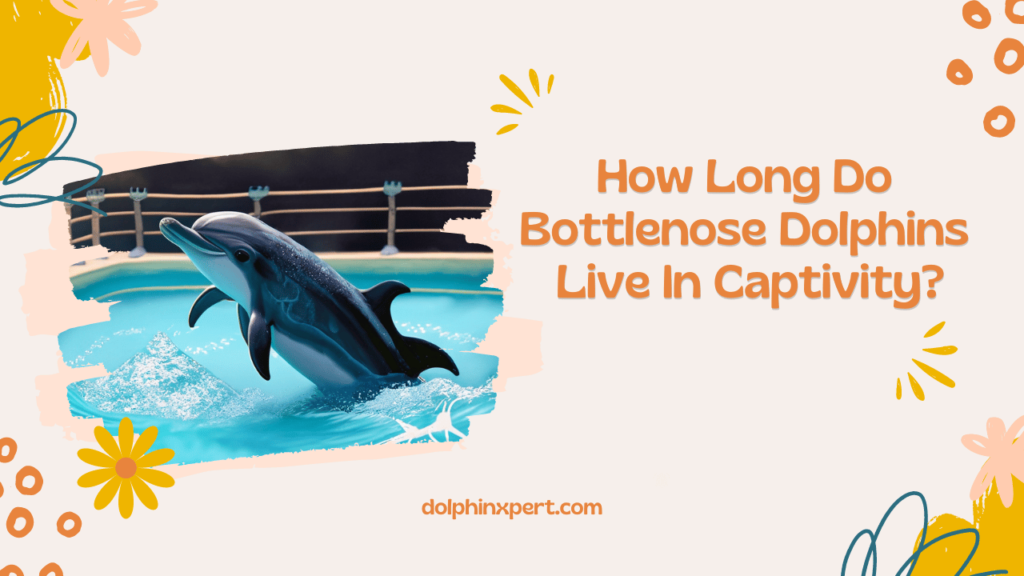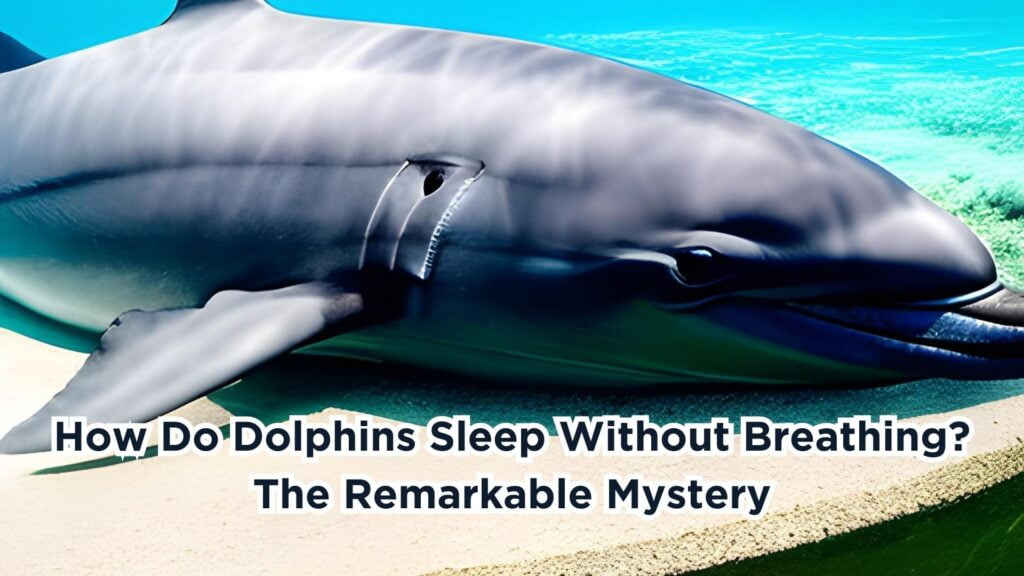Last updated on October 7th, 2023 at 04:41 pm

It’s knowledge that bottlenose dolphins are intelligent, graceful and incredibly captivating creatures. They have become attractions, in aquariums and marine parks worldwide giving visitors the opportunity to observe and interact with these animals up close.
“How long do bottlenose dolphins live in captivity” is a common query, though. The lifetime of bottlenose dolphins will be discussed in detail in this article, along with potential causes for either their long life or lack thereof.
Table of Contents
- 1 How Long Do Bottlenose Dolphins Live In Captivity?
- 2 How Long Do Wild Bottlenose Dolphins Live?
- 3 How Long Do Dolphins Live In Captivity?
- 4 How Long Do Dolphins Live In Captivity Vs The Wild?
- 5 Why Do Dolphins Not Live As Long In Captivity?
- 6 Oldest Dolphin In Captivity
- 7 How Long Can Dolphins Live In Aquarium?
- 8 FAQs (Frequently Asked Questions)
- 9 Conclusion
How Long Do Bottlenose Dolphins Live In Captivity?
Bottlenose dolphins in captivity have an average lifespan of 28.2 years and a median lifespan of 29 years.
The average survival time for all bottlenose dolphins who survived for more than a year in captivity, according to a study that looked at data from 67 institutions that currently or in the past housed the animals, was 12 years, 9 months, and 8 days.
How Long Do Wild Bottlenose Dolphins Live?
In their natural environment, bottlenose dolphins can have extraordinarily long lifetimes. Wild bottlenose dolphins typically live 40 to 50 years.
It’s important to keep in mind that this is a rough guide and that certain dolphins may have longer or shorter entire lives depending on a variety of different conditions.
Factors Affecting Wild Bottlenose Dolphins’ Lifespan
Several factors contribute to the lifespan of wild bottlenose dolphins. These factors include:
Predation: Sharks and killer whales are two common predators that pose a threat to bottlenose dolphins. People tend to live longer who can successfully evade or defend themselves from these predators.
Food Availability: The general health and longevity of wild dolphins are greatly influenced by the availability of prey. The essential components for optimum health and a longer lifespan are found in a diet high in fish and squid.
Environment: Elements including water temperature, pollution levels, and the availability of suitable habitats in the marine environment can have an impact on the health and survival of wild bottlenose dolphins.
See Also: Do Dolphins Live in Saltwater or Freshwater? Aquatic Dwellings
How Long Do Dolphins Live In Captivity?
The average lifespan of dolphins in captivity is 28-29 years. However, there is a wide range of lifespans, with some dolphins living for only a few years and others living for over 40 years.
Several factors contribute to the reduced lifespan of dolphins in captivity:
Restricted Environment: Captive dolphins live in tanks that are significantly smaller than their natural habitats. This confinement can lead to stress, behavioral abnormalities, and physical health issues, which can shorten their lifespan.
Lack of Exciting Activities: Wild dolphins participate in a variety of activities, including socializing, hunting, and exploring vast oceanic lands. These activities are severely constrained in captivity, depriving them of cerebral stimulation and harming their general wellbeing.
Concerns about diet: The lack of variety in confined dolphins’ diets may affect how much food they consume. In contrast to captive dolphins, who frequently have a restricted diet that could have negative effects on their health, wild dolphins have access to a vast variety of fish and other aquatic species.
How Long Do Dolphins Live In Captivity Vs The Wild?
The difference in lifespans between dolphins and those living freely is quite noticeable. While wild bottlenose dolphins can live for, up to 50 years or more those held captive usually reach an age range of around 20 to 35 years.
This significant contrast raises concerns regarding the long-term effects that captive settings may have on the wellbeing and lifespan of these mammals.
Why Do Dolphins Not Live As Long In Captivity?
The limited lifespan of dolphins in captivity can be attributed to several factors associated with their confined environment. These factors include:
Stress and Depression: The emotional and psychological stress of living in captivity can take a toll on dolphins, leading to a shorter lifespan. The absence of their natural surroundings, social structures, and freedom to explore can result in chronic stress and depression.
Unnatural Social Dynamics: In the wild, dolphins live in complex social groups and form strong bonds with their pod members. Captive environments often lack the opportunity for dolphins to establish and maintain these social connections, which can affect their emotional well-being.
Health Complications: Limited space, lack of exercise, and suboptimal water conditions in captivity can contribute to various health issues, including respiratory problems, skin ailments, and weakened immune systems, ultimately shortening their lifespan.
See Also: How Do Dolphins Live Together? Eco-Friendly Coexistence
Oldest Dolphin In Captivity
Despite the inherent challenges encountered in captivity, some dolphins have defied the odds and lived longer lives.
One notable example is Nellie, a bottlenose dolphin who resided in Marineland Dolphin Adventure in Florida. Nellie lived to be an impressive 61 years old, surpassing the typical lifespan of dolphins in captivity by a considerable margin.
How Long Can Dolphins Live In Aquarium?
Aquariums aim to create a controlled environment that closely resembles the habitat of dolphins. However, despite these efforts the lifespan of dolphins in aquariums is comparatively shorter than their counterparts in the wild. On average dolphins living in aquariums survive for 20 to 35 years.
FAQs (Frequently Asked Questions)
Do Dolphins Die Faster In Captivity?
Dolphins in captivity tend to have a shorter lifespan compared to their wild counterparts. The stress, limited space, and suboptimal conditions they face in captivity contribute to their reduced longevity.
What Is The Oldest Dolphin In Captivity?
Nellie, a bottlenose dolphin who resided in Marineland Dolphin Adventure in Florida, holds the record for being the oldest dolphin in captivity, living to be 61 years old.
Do Dolphins Get Depressed In Captivity?
Yes, dolphins in captivity can experience stress, depression, and other psychological issues due to the restricted environment, lack of mental stimulation, and the absence of their natural social structures.
How Does Captivity Affect A Dolphin’s Lifespan?
The limited space, lack of mental and physical stimulation, unnatural social dynamics, and potential health complications associated with captivity can significantly impact a dolphin’s lifespan, leading to a shorter life expectancy.
Are There Any Benefits To Keeping Dolphins In Captivity?
While some claim that keeping dolphins in captivity facilitates educational possibilities and conservation initiatives, it is important to take into account the ethical issues and potential detrimental impacts on the health and longevity of captive dolphins.
Conclusion
Concerns regarding the effects of confinement and insufficient stimulation on these marine animals are raised by the question of how long bottlenose dolphins live in captivity compared to the wild.
While dolphins in their habitat can live up to 50 years or more those kept in captivity often experience a shorter lifespan of approximately 20 to 35 years.
The confined environment, lack of physical stimulation well as restricted social interactions contribute to the decreased longevity observed in dolphins living in aquariums and marine parks.

Mr. Das, a certified pharmaceutical scientist, holds a Bachelor of Science in Pharmaceutical Sciences and passionately contributes to dolphin conservation as a member of the committee in Bangladesh.


